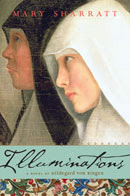
Mary Sharratt’s Illuminations (New York: Houghton Mifflin Harcourt, 2012) tells the story of Hildegard von Bingen, the famous German Benedictine Abbess who lived from 1098-1179. Hildegard’s genuine mystical prophecies earned her the name, the Sibyl of the Rhine.
Given to the church at the tender age of 8, Hildegard was entombed in a tiny room with a radical anchorite called Jutta von Sponheim, and here she grew into a great thinker who had a strong impact on the early Catholic Church. She also became a gifted composer and artist, and was able to heal the local population with herbal medicines and gemstones. Her God was a feminine version of love.
Hildegard began experiencing visions at the age of 3, and eventually began recording them in a brilliantly illuminated manuscript. But were these images sent from God or from Satan? Fortunately she was able to convince those around her that her mysticism was a holy gift. And as she lay dying her sister nuns claimed to see two streams of light in the sky crossing over her room – a sign they interpreted as a heavenly blessing.
Illuminations is an absorbing story about a fascinating woman who bravely took on the medieval patriarchy to create a safe community for religious women. The book is well-written, filling the gaps in history with plausible suggestions that help explain why certain characters acted as they did. Although Sharratt is aware that if Hildegard had lived at a later time in Puritan England she might well have been accused of witchcraft (http://marysharratt.blogspot.com/2012/07/of-witches-and-saints-mother-demdike.html), Illuminations maintains a firm focus on the mystic’s religious calling, and does not undermine her venerable status within the church. A very good read!
Share this:




